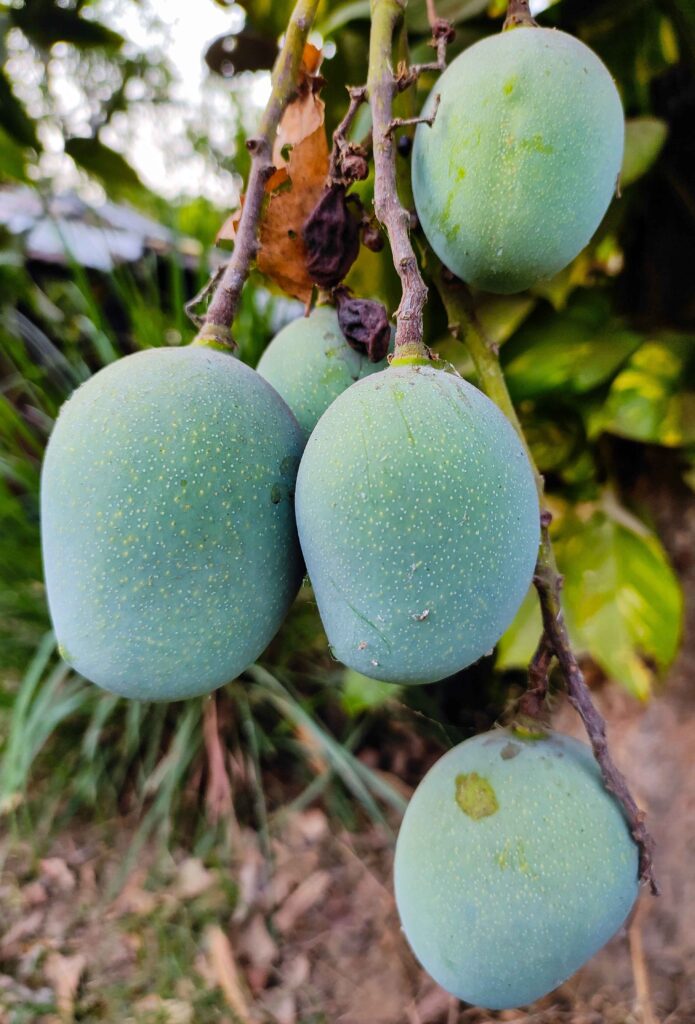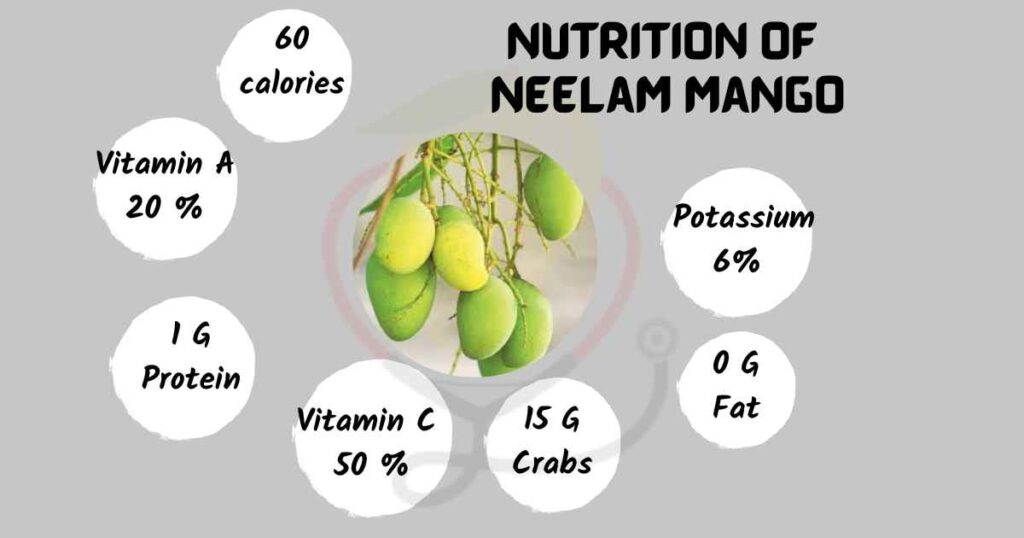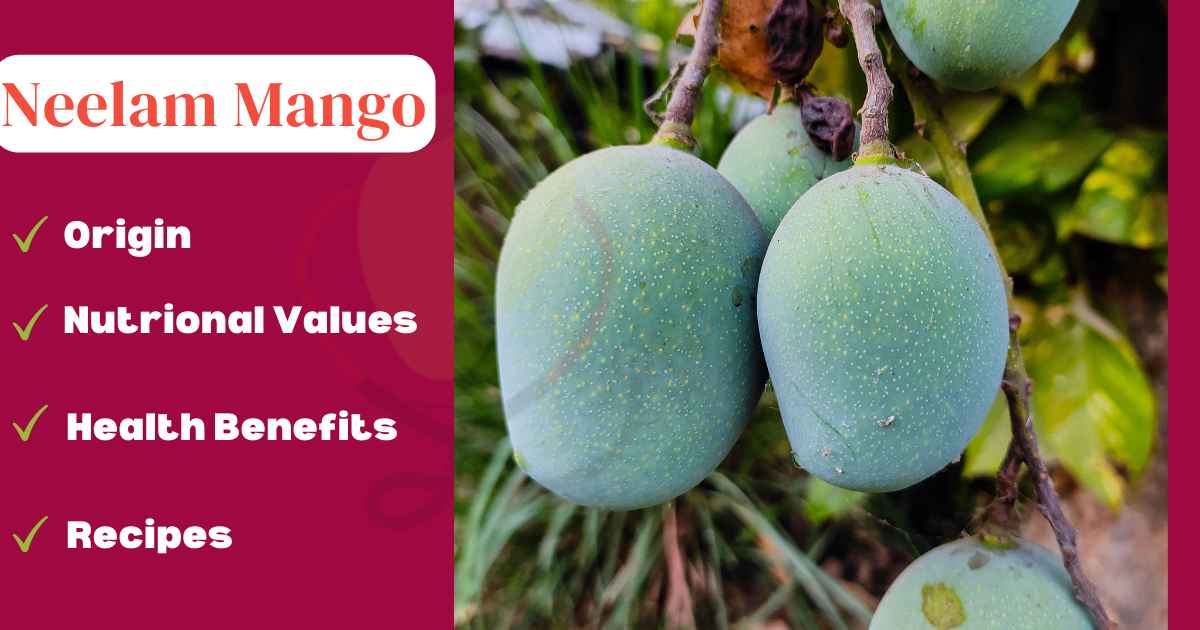Neelam Mango is a mango variety that is primarily grown in South India, particularly in the state of Andhra Pradesh. [1]
It is a medium-sized mango with an oval shape and a greenish-yellow skin that turns golden-yellow as it ripens. The fruit is sweet and juicy with a mild flavor.

In this article we will explore the nutritional benefits of Neelam Mango, its health benefits.
Origin of Neelam Mango
Neelam Mango, also known as the Malgova Mango, is a popular variety of mango that originated in the southern Indian state of Tamil Nadu. [2]
It is primarily cultivated in various regions of Pakistan and India. It is named after the Neelam River that flows through the region.
Cultivation of Neelam Mango
Neelam Mango is primarily grown in the states of Tamil Nadu, Karnataka, and Andhra Pradesh. [3]
It is a late-season mango, with the harvesting season starting in June and ending in August. The fruit is usually hand-picked and packed in crates for transportation.
Nutritional Values of Neelam Mango
Neelam Mango is a rich source of essential vitamins and minerals that are beneficial for the body. Here are some of the key nutrients found in Neelam Mango: [4]

- Calories: 60
- Carbohydrates: 15g
- Fiber: 2g
- Fat: 0g
- Protein: 1g
- Vitamin C: 50%
- Vitamin A: 20%
- Potassium: 6%
- Vitamin E: 4%
- Vitamin K: 6%
Health Benefits of Neelam Mango
Neelam Mango has numerous health benefits that make it an excellent addition to a healthy diet. [5] Here are some of the health benefits of Neelam Mango:

1: Boosts Immunity
The high vitamin C content in Neelam Mango helps boost the immune system, which can help protect the body against infections and diseases. [6]
2: Promotes Healthy Digestion
The fiber in Neelam Mango promotes healthy digestion and can prevent constipation. [7]
3: Lowers Cholesterol
The fiber and antioxidants in Neelam Mango can help lower cholesterol levels, which can reduce the risk of heart disease. [8]
4: Improves Skin Health
The vitamin C and beta-carotene in Neelam Mango can improve skin health by promoting collagen production and protecting against UV damage. [9]
Recipes Using Neelam Mango
Here are some simple and delicious recipes using Neelam mango:

- Neelam Mango Lassi
- Neelam Mango Salad
Neelam Mango is a nutritious and delicious tropical fruit that is packed with essential vitamins, minerals, fiber, and antioxidants. Incorporating this fruit into your diet can provide numerous health benefits, such as boosting immunity, promoting healthy digestion, lowering cholesterol, and improving skin health. Whether you eat it fresh, blend it into a smoothie, or add it to your salads or salsas, Neelam Mango is a versatile and flavorful addition to any diet.
FAQs
What are the benefits of Neelam mango?
It is a good source of vitamin A, C and Potassium.
It protects from cancer due to the presence of certain antioxidant compounds.
Lowers cholesterol.
What is a Neelam mango?
Neelam mangoes are renowned for their enchanting floral fragrance, appealing shape, and delightful taste. They are predominantly grown in the states of Karnataka, Tamil Nadu, and Andhra Pradesh.
What is the season of Neelam mango?
It is a very late-season mango, generally maturing from August to September.
Is Neelam mango good for weight loss?
Yes, Neelam Mango is good for weight loss. Neelam mango is relatively low in calories and high in fiber, making it a good option for weight loss when eaten in moderation.
What are the characteristics of Neelam mangoes?
The Neelam mango is a high-yielding late-season variety originating from South India. The fruits are medium-sized, known for their excellent quality and delightful flavor. The flesh is soft, yellow, and free from fibers.
What are the other names of Neelam mango?
The common synonyms of this variety are Totapuri, Kallamai, Thevadiyamuthi, Collector, Sundersha, Burmodilla, Killi Mukku and Gilli Mukku.

